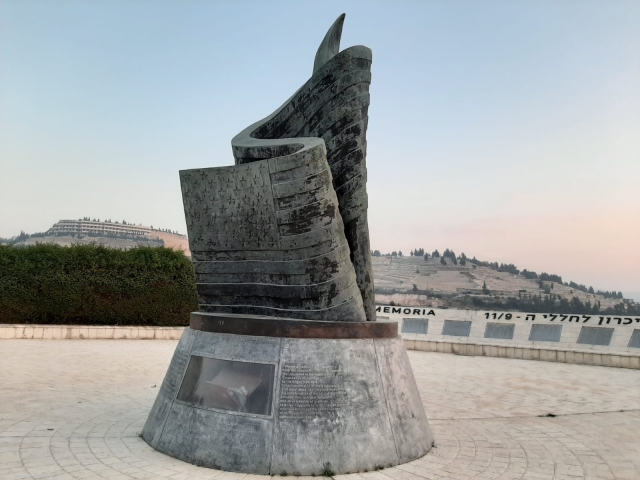A peculiar study coming out from Tel Aviv University claims that the people of Ukraine are more resilient during times of war than Israelis. Although the motives behind this study are unknown one could only imagine that the intention was to support the people of Ukraine. A just cause, but why would Israeli researchers use their own people as the comparison, especially when there is nothing to be compared between Israel and Ukraine?
According to the study, despite the significant dangers and threats they face, the Ukrainian “hope index” was measured as higher than that of Israelis during the 2021 operation in Gaza, when citizens were targets of non-stop rockets from Hamas. A “hope index” is simply the wrong way to measure a people's resilience in times of war.
Israel has been in a state of war for nearly 75 years, with most citizens either exposed to acts of terror and war at least once in their lifetime. Ukraine has only technically been in existence for 3 decades and has been in a state of active war for less than a year. Perhaps many citizens have been exposed to acts of nationalistic terrorism, but a comparison between Palestinian terrorism and civil unrest is simply incompatible.
Israel's resilience is an inspiration to Ukrainians, says Olena Zelenska, Ukrainian President Volodymyr Zelensky’s wife, and added: 'Only those who do not value their lives and the lives of those around them are not afraid,' https://t.co/bf3NhnlJXV
— Adam Milstein (@AdamMilstein) August 1, 2022
On a scale of one to five, the researchers found that the danger in the eyes of Ukrainian citizens is perceived as much more vivid (3.7) than Israelis’ perception of danger in the rounds of fighting against Hamas in Gaza (2.45). Ukrainians were also found to view their situation as more threatening (3.29) than Israeli citizens did during the operation (2.79).
This entire measurement system the researchers have created for the purpose of releasing a report is exactly why society as a whole is losing interest in study papers of this nature. To try and quantify with numbers, and without historical and demographic facts, the amount of stress and threat Israelis feel in comparison to Ukrainians is one-dimensional at best.
Today is Tisha B'Av; the saddest day in the Jewish calendar, a day of mourning, of remembering. Israel is a country in which Jews have the freedom to keep the memories of our past traumas alive, to safeguard our truth, our evidence, our stories, and our names. And to feel strong.
— Eve Barlow (@Eve_Barlow) August 7, 2022
Professor Bruria Adini and Professor Shaul Kimhi of the ResWell Research Center at Tel Aviv University’s Sackler Faculty of Medicine then went on to explain their findings. “The perception of a threat as existential to the survival and sovereignty of the state and society is likely, under certain conditions, to enhance the population’s societal resilience and sense of hope.”
Professors at a well-established Israeli university have dictated that Ukrainians are more determined in their war with Russia because they feel more threatened than Israelis do by terrorists. The real answer is Israelis are so determined in their war against terrorism that they developed an entire world-class defensive military to ensure they don’t feel the daily threats terrorism offers, and even with the IDF, daily threats are felt but to a lesser extent.
Tens of thousands of Israeli civilians have spent most of their day in bomb shelters, showing tremendous resilience, as Islamic Jihad terrorists in #Gaza targeted them more than 70 times by indiscriminately firing rockets at Israeli towns & cities.
— Israel Foreign Ministry (@IsraelMFA) February 24, 2020
Terrorism will never prevail. pic.twitter.com/FkawxkW2qZ
The researchers then continue in their report, claiming that due to the nature of Ukraine’s war, resilience is higher. “ Moreover, it appears that the war launched by Russia against Ukraine has actually contributed to the process of Ukrainian identity-building, which also leads to increased levels of resilience, as well as an extremely high sense of hope.”
“The Israelis, unlike the Ukrainian people, do not feel that their country is under a direct existential threat and have, to a certain degree, adapted to an ‘emergency routine’ due to the recurrent conflicts. In light of this, they present lower levels of resilience relative to Ukrainians...”
Ukrainians have a relatively high level of national resilience – 4.35 on a scale from one to six – a study from Tel Aviv University found.#Ukraine | #Russia https://t.co/aaFfOBW7fW
— The Jerusalem Post (@Jerusalem_Post) October 3, 2022
A note to these respected professors, consider your wording next time you would like to argue that Ukraine’s war built a“Ukrainian identity” At a faster rate than Israel’s never-ending war with terrorism.
Zionism is stronger than ever, with right-wing parties like Ben Gvir’s “Otzma Yehudit” receiving 13-14 mandates in recent polls ahead of the elections, and the so-called right-wing bloc, those who firmly believe Israel must use a heavy hand to protect its sovereignty which includes the communities in Judea & Samaria, which make up more than half of the electorate can attest to just how resilient Israelis are in their 75-year long war.


